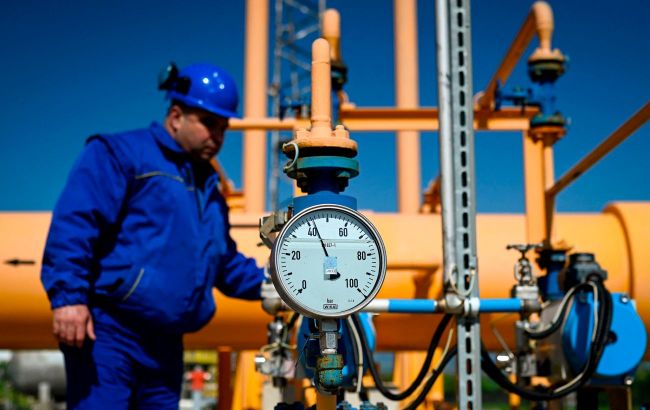Gas transit halted? Will Ukraine extend gas contract with Russia and what happens if not
 Illustrative photo (Getty Images)
Illustrative photo (Getty Images)
Despite the ongoing war, Ukraine continues to transport Russian gas to European Union countries. The contract remains valid until the end of the year, and it currently appears that gas transit will cease in 2025.
More details on this and the future of the GTS (gas transportation system) without a transit contract can be found in the material by RBC-Ukraine.
Sources: Financial Times, Bloomberg, Reuters, and DW, as well as statements from Prime Minister Denys Shmyhal, Energy Minister Herman Halushchenko, EU Commissioner Kadri Simson, and comments from Volodymyr Omelchenko, Director of Energy Programs at the Razumkov Center.
Content:
- Why Russian gas transit to Europe continues?
- What will happen to contract after 2024?
- Does this mean gas supplies through Ukraine will end?
- What is being said in Europe and Russia?
- How will GTS (gas transportation system) operate without transit and what is biomethane's role?
Why Russian gas transit to Europe continues?
The current gas transit contract between Naftogaz of Ukraine and Russia’s Gazprom was signed at the end of 2019. It is a five-year agreement, with terms that guaranteed the transit of 65 billion cubic meters of gas in 2020 and at least 40 billion cubic meters in subsequent years.
Following the full-scale invasion, volumes decreased, and by 2023, transit was down to 15 billion cubic meters. This reduction is due to the loss of control over the entry point at the Sokhranivka gas metering station on the border with Luhansk region.
The second entry to Ukraine's gas transportation system (GTS) at Sudzha (on the border with Sumy region) remains operational. It is one of the two pipeline routes, along with the Turkish Stream, through which Russian gas still reaches the EU.
Notably, since 2022, supply via the Nord Stream pipelines has ceased due to sabotage, and deliveries through the Yamal-Europe pipeline via Belarus have stopped following Poland’s refusal.
"The reason why Naftogaz has continued with this transit deal [even amid the war with Russia] is to satisfy the EU’s gas needs and to remain as a reliable partner [to the bloc]," explained company head Oleksii Chernyshov in a recent interview with the Financial Times.
Practically since the invasion began, Gazprom has been underpaying on the contract, and today Naftogaz receives less money than it spends on organizing the transit. According to Chernyshov, the cash flow from this operation is constantly negative.
What will happen to contract after 2024?
Ukrainian authorities have repeatedly stated that they will not negotiate a new agreement with Russia.
"As for transit, we certainly do not intend to negotiate with the aggressor country to continue and sign our names under an agreement," Prime Minister Denys Shmyhal said in early March.
Energy Minister Herman Halushchenko confirmed that the Ukrainian side does not plan to enter into any additional agreements or extend the current contract. According to him, last year a stress test was conducted on the GTS and underground gas storage facilities. The results showed that the system can operate without transit.
The EU is also not interested in continuing transit through Ukraine. According to the RepowerEU initiative, European countries will completely abandon Russian gas by 2027. Most have already reduced their dependence to nearly zero.
"The official position for now is that Ukrainian companies and the Ukrainian government will not negotiate with Gazprom. Therefore, transit is unlikely because it is impossible without a contract," Volodymyr Omelchenko, Director of Energy Programs at the Razumkov Center, told RBC-Ukraine.
Does this mean gas supplies through Ukraine will end?
A contract between Ukraine and Gazprom is not necessary for continuing deliveries. If desired, any European company could purchase GTS capacities and pay for transit directly to the GTS Operator, as the EU has not banned the import of natural gas from Russia.
Theoretically, Russian gas supplies through Ukraine could continue after 2024, Omelchenko explains. This would be possible if European companies negotiate directly with Gazprom and the GTS Operator.
In this case, the most likely scenario would be European companies signing an additional agreement where the gas delivery point is transferred to the Russian-Ukrainian border near the Sudzha GMS.
"But this is only theoretical, as such a technical agreement under war conditions, in my view, is impossible," the expert added.
In March, Prime Minister Denys Shmyhal said that Kyiv was negotiating with European countries about gas transit after 2024. According to him, if EU countries formed a consortium or one of the partners acted as a transit entity for their own gas (registered at the Russian-Ukrainian border), Ukraine would be ready to responsibly provide such a service.
Some market participants considered this option, but it seems unlikely to lead to real agreements, notes Bloomberg. Earlier, Minister Halushchenko said that no decisions are on the table, so he does not see such a possibility.
What is being said in Europe and Russia?
Among the countries interested in pipeline gas from Russia are Austria, Czechia, Slovakia, and Italy. Additionally, Hungary, currently receiving gas through the Turkish Stream, may consider reverting to the Ukrainian route.
Officially, Budapest claims otherwise, but the topic was raised during Hungarian Foreign Minister Péter Szijjártó's visit to Ukraine in January. Slovak Prime Minister Robert Fico mentioned that the issue of transit to his country was nearly resolved, but Ukrainian officials clarified that no agreements had been reached.
EU Energy Commissioner Kadri Simson stated that the European Commission would not negotiate with Russia as it did previously in the trilateral process. According to her, the EU is working intensively to provide member countries with alternative routes and suppliers.
Two weeks ago, in response to a question from RBC-Ukraine, she said that Brussels does not ask Ukraine to negotiate with Russia. However, she suggested that negotiations could begin once Russia withdraws its troops from Ukraine.
Simson also reminded that in 2023, Moscow unilaterally reduced supplies to manipulate European markets. Ending transit via the Ukrainian route will be costly, but the EU is prepared for this, she added.
Western agencies report that the share of pipeline gas in European markets fell from 37% to 8.7% after 2022. Norwegian companies now occupy Gazprom's place, holding a share of around 30%.
As a result, Gazprom suffered record losses over the past 25 years. Its revenues for 2023 fell by about 30%, leading to net losses of nearly $7 billion.
Despite this, the Russian side has not publicly expressed interest in continuing transit through Ukraine. Vladimir Putin said that Europeans must decide whether they need the gas, and if not, then they (Russia - ed.) can manage without it (transit - ed.).
Volodymyr Omelchenko believes that Russia is indeed interested because it does not want to lose the lucrative European market entirely. Substitution with the Chinese market is not happening.
"As we can see, negotiations at the highest level with Xi Jinping have led nowhere. The Chinese do not want to engage in the Power of Siberia 2 project. I think Gazprom is interested in the Ukrainian route, but we are not interested because we cannot negotiate during the war. This would mean being subjected to conditions and having our hands twisted again," he said in an interview.
Gazprom's record losses reflect the impact of European sanctions and limited partnership with China. Moscow is trying to increase pipeline gas sales via the Power of Siberia and LNG from Sakhalin Island.
Another hope is the Power of Siberia 2 pipeline through Mongolia. However, the project is stalled due to disagreements with Beijing over prices and other issues. In any case, supplies to China will never fully compensate for the lost European market, Reuters writes.
How will GTS (gas transportation system) operate without transit and what is biomethane's role?
Without gas transit from Russia, Ukraine's GTS will function in an unconventional mode, but the necessary measures are already in place.
"There are no major difficulties expected in transitioning the GTS to a transit-free mode. How will it operate? It will involve pumping gas from domestic production and storing natural gas in underground storage facilities," explained Omelchenko.
The capacities of the GTS will be utilized to transport gas from Europe to underground storage facilities during the injection season and in the reverse direction during the autumn-winter period. According to Oleksii Chernyshov in an interview with FT, European countries maintain interest in Ukrainian underground storage facilities. It is expected that European gas stocks in Ukraine will increase from 2.5 billion cubic meters last year to 4 billion this winter.
On May 14, President Volodymyr Zelenskyy signed a law regarding customs clearance for biomethane. The lobbying organization of German gas companies, Zukunft Gas, called this a green light for green energy. As reported by DW, Ukraine has pretty much opened the doors for biomethane deliveries to Germany.
There was no direct ban on exports, but customs procedures were not specified either. Therefore, changes to the Customs Code essentially eliminated the gray zone in biomethane supply from a legislative standpoint.
According to some estimates, the potential of the Ukrainian sector is estimated at 20 billion cubic meters of biomethane per year. Zukunft Gas assumes that large agricultural areas could provide production of up to 22 billion cubic meters annually.
What previously might have seemed like a non-priority issue is now taking on more concrete features. The creation of favorable legal conditions by Germany and the EU is underway. Perhaps the conclusion of the gas transit contract at the end of 2024 will expedite the legislative process in Europe.
According to Omelchenko, the export of biomethane could begin as soon as relevant laws are enacted in the EU and agreements are reached with Ukraine.
"This could happen in the coming months. But these won't be massive volumes at first," the expert added.

